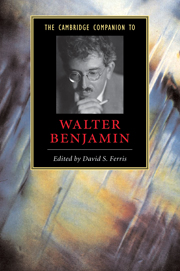Book contents
- Frontmatter
- Introduction
- 1 Walter Benjamin and the European avant-garde
- 2 Art forms
- 3 Language and mimesis in Walter Benjamin’s work
- 4 Walter Benjamin’s concept of cultural history
- 5 Benjamin’s modernity
- 6 Benjamin and psychoanalysis
- 7 Benjamin and the ambiguities of Romanticism
- 8 Body politics
- 9 Method and time
- 10 Benjamin’s phantasmagoria
- 11 Acts of self-portraiture
- Guide to further reading
- Index
- Series List
5 - Benjamin’s modernity
Published online by Cambridge University Press: 28 May 2006
- Frontmatter
- Introduction
- 1 Walter Benjamin and the European avant-garde
- 2 Art forms
- 3 Language and mimesis in Walter Benjamin’s work
- 4 Walter Benjamin’s concept of cultural history
- 5 Benjamin’s modernity
- 6 Benjamin and psychoanalysis
- 7 Benjamin and the ambiguities of Romanticism
- 8 Body politics
- 9 Method and time
- 10 Benjamin’s phantasmagoria
- 11 Acts of self-portraiture
- Guide to further reading
- Index
- Series List
Summary
Any argument that starts with the claim that it concerns a theory of modernity is constrained to account for the nature of modernity's inception. Even in working with the assumption of modernity's presence there would still have to be a description of that which was located in its differentiation from the modern. Part of the argument to be developed here is that for the major thinkers of modernity its occurrence is thought in terms of a break or an interruption. Here, the particular project is to locate that thinking in the writings of Walter Benjamin. A context therefore is set by those writings and the presence within them of attempts to develop a relationship between modernity and its necessary interarticulation with a philosophical conception of historical time. Given this context, the opening question has to concern the specificity of interruption within those writings.
How is interruption to be thought? What is the conception of interruption at work within Benjamin’s writings? Although it appears as a motif in his engagement with Romanticism and is then repositioned – if not reworked in the later writings in terms of a thinking of historical time – interruption as a mode of thought within Benjamin’s work can be identified under a number of different headings.
- Type
- Chapter
- Information
- The Cambridge Companion to Walter Benjamin , pp. 97 - 114Publisher: Cambridge University PressPrint publication year: 2004
- 5
- Cited by

